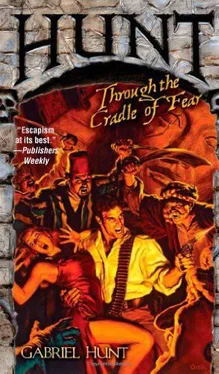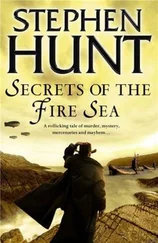Gabriel Hunt - Hunt Through the Cradle of Fear
Здесь есть возможность читать онлайн «Gabriel Hunt - Hunt Through the Cradle of Fear» весь текст электронной книги совершенно бесплатно (целиком полную версию без сокращений). В некоторых случаях можно слушать аудио, скачать через торрент в формате fb2 и присутствует краткое содержание. Год выпуска: 2011, Издательство: Dorchester Publishing Co., Inc., Жанр: Старинная литература, на английском языке. Описание произведения, (предисловие) а так же отзывы посетителей доступны на портале библиотеки ЛибКат.
- Название:Hunt Through the Cradle of Fear
- Автор:
- Издательство:Dorchester Publishing Co., Inc.
- Жанр:
- Год:2011
- ISBN:нет данных
- Рейтинг книги:3 / 5. Голосов: 1
-
Избранное:Добавить в избранное
- Отзывы:
-
Ваша оценка:
- 60
- 1
- 2
- 3
- 4
- 5
Hunt Through the Cradle of Fear: краткое содержание, описание и аннотация
Предлагаем к чтению аннотацию, описание, краткое содержание или предисловие (зависит от того, что написал сам автор книги «Hunt Through the Cradle of Fear»). Если вы не нашли необходимую информацию о книге — напишите в комментариях, мы постараемся отыскать её.
Hunt Through the Cradle of Fear — читать онлайн бесплатно полную книгу (весь текст) целиком
Ниже представлен текст книги, разбитый по страницам. Система сохранения места последней прочитанной страницы, позволяет с удобством читать онлайн бесплатно книгу «Hunt Through the Cradle of Fear», без необходимости каждый раз заново искать на чём Вы остановились. Поставьте закладку, и сможете в любой момент перейти на страницу, на которой закончили чтение.
Интервал:
Закладка:
“Very good,” DeGroet said. “But there is a specific instruction you omitted.”
“What? The bit about unburying him?”
“Yes,” DeGroet said. “That bit.”
“‘The sands in which I lie have covered me. Swear to me that you will do what I ask of you, my son, that I may know you as my source of help, and I may be joined with you in eternal sovereignty.’”
“‘The sands in which I lie,’” DeGroet repeated. “The young prince had the best of intentions, but he never did manage to fulfill his promise. It took three millennia to do the job—longer, nearly three and a half. And then they stopped, because they thought they were done. The fools.”
“What are you talking about?” Sheba said, and where he was crouching among the crates Gabriel thought the same thing. Three millennia? The Hungarian countryside boasted any number of ruins dating back to the time of the Romans, but those were only two thousand years old, not three or four thousand. There was nothing in the country that old.
And sands? Hungary was landlocked, for heaven’s sake.
Where the hell were they?
Gabriel glanced around, peered between the crates, saw no one facing in his direction. Reaching back into the crate he’d just exited, he dug under the boxes of ammunition till he uncovered the long barrel of a rifle—he’d felt it beneath him on the plane, but couldn’t get at it while he was lying on top of it. Now he set it down on the ground, loaded it, and slung a bandolier of extra rifle shells over his head. Just in case the bullets he’d slipped into his Colt didn’t fire after all. Or, hell, even if they did. DeGroet had at least a dozen men here, maybe more—it was impossible for Gabriel to be too heavily armed.
Gripping the rifle under one arm and unholstering the Colt, Gabriel crept cautiously out of his little enclosure and into the shadow of the truck that had brought him. Then he stood up for the first time in twelve hours. Once the pins and needles in his legs had subsided, he leaned around the rear corner of the truck to get his first good look at where he was—and his jaw fell open.
Chapter 6
It was the dead of night, two hours before the dawn, and except for the movement of DeGroet’s men, the Plateau of Giza was silent, still. In the distance, the Great Pyramid—Egypt’s towering mausoleum for the Pharaoh Khufu, the last surviving Wonder of the Ancient World—loomed darkly against the deeper black of the sky. Around it, the smaller pyramids built to house Khufu’s wives and mother, and farther out the ones for Khafre and Menkaure, his successors, gave the plain a jagged skyline, like a giant jaw full of pointed teeth. The men, by comparison, looked tiny, insignificant, lost.
Immediately before them, facing them in its eternal crouch, blanketing them with its moon-cast shadow, was the Great Sphinx.
DeGroet and Sheba stood between the lion’s paws, Andras shining his flashlight’s paltry beam at the stone stele erected there by Thutmose IV. Other men bustled about, Hungarians in western clothing mixing with locals whose garb ranged from turban to fez to coarse burnoose, wrapped tight against the late-night desert chill. Camels stood beside cars, shivering and ducking their heads to nose at the sand. Tilting his own head back to look up, Gabriel saw the great beast towering above them all, its sculpted head as high in the air as the roof of the Discoverers League building back in New York, its shoulders as broad as the building’s facade, and its torso stretching into the distance behind it for the better part of a football field’s length.
Its body, though eroded by thousands of years of exposure both to the elements and to mistreatment by men, still showed the muscular form of a prone lion, facing east to greet the rising sun as it ascended above the Nile. It had lain like that since before the pyramids themselves all were built. Two thousand years before the birth of Alexander the Great, one thousand years before the birth of Moses, the Sphinx had already been meeting each sunrise with its majestic stare for a century or more. Today the stare emerged from the face of a pharaoh, framed on either side by the traditional Egyptian headdress of state, his stone lips cracked and ruined, the better part of his great carved nose shattered off. But this pharaonic head looked strangely small compared to the size of the body and it was commonly thought that the statue had originally borne the head as well as the body of a lion—that it had begun its existence as a monumental statue of a cat, symbol of the sun god, and that only later, under the guidance of a despot mad with vanity, had the feline head been recarved into a man’s, making what had once been a gorgeous animal into a hybrid, a monster.
The Egyptians hadn’t called the monster “sphinx”—it had been the Greeks who’d given it this name when eventually they’d landed from across the northern seas, recognizing in its hybrid shape a resemblance to a local legend of their own, of a woman with a lion’s torso, an eagle’s wings, and a serpent’s tail. The word meant “strangler” or “one who chokes” in Greek, a reminder of how the Greek sphinx killed unlucky travelers who failed to answer her famous riddle. But the Great Sphinx of Giza had no such reputation for limiting himself to a single method of slaughtering his prey, and in Arabic he was called simply Abul-Hôl, the Father of Fear.
“Why have you brought me here?” Sheba asked, when DeGroet’s silence had stretched on uncomfortably long. “What do you want from me?”
“You see that, Karoly? I told you she would be cooperative once we got her here.” Gabriel saw the man beside DeGroet, a short, broad fellow in black with a cigarette at his lips, nod impatiently. He looked around, intently scanning the area, and Gabriel ducked back behind the truck before Karoly’s gaze made it to where Gabriel was standing. This was DeGroet’s right hand, clearly—Andras was muscle, nothing more, dangerous only if you got within arm’s reach, but this Karoly would be dangerous at any distance.
“I didn’t say I would cooperate,” Sheba said. “I just asked—”
“Enough,” DeGroet said. “You will cooperate or I will cut that lovely dress off your body with three strokes of my sword and instruct every man here to take his pleasure with you. Do we understand each other?” He waited for a response. “Speak up, my dear. Do we understand each other?”
Sheba’s voice shook. “Yes.”
“Yes, what?”
“We understand each other.”
“Do you believe I will do it or shall I give you a little taste to prove it?”
“No, I believe you.”
“Good,” DeGroet said, his voice softening again. “I regret the need to be so harsh with you, my dear, but we do have only a limited time here and there’s no telling how long it might take.”
“How long what might take?” Sheba said.
“Come here,” DeGroet said, and as they walked around the left paw of the Sphinx, their voices became quieter once more—enough so that Gabriel could no longer make out what was being said. He glanced around, picked a moment when no one was looking his way, then darted out from behind the truck to where a local stood with a shovel against one shoulder. Gabriel took aim carefully, then slugged him two-handed on the back of the head, catching him and the shovel both before either could land noisily on the ground. He dragged the man back to the truck, stripped him of his burnoose, and rolled him between the wheels, much as he had Stephen at the other end of the journey. Gabriel threw the burnoose on, slipped its hood over his head and crossed the layers of fabric over his chest to conceal the bandolier. He hefted the shovel and the rifle together and hastened off toward the long, low paw around which DeGroet and Sheba had disappeared.
Читать дальшеИнтервал:
Закладка:
Похожие книги на «Hunt Through the Cradle of Fear»
Представляем Вашему вниманию похожие книги на «Hunt Through the Cradle of Fear» списком для выбора. Мы отобрали схожую по названию и смыслу литературу в надежде предоставить читателям больше вариантов отыскать новые, интересные, ещё непрочитанные произведения.
Обсуждение, отзывы о книге «Hunt Through the Cradle of Fear» и просто собственные мнения читателей. Оставьте ваши комментарии, напишите, что Вы думаете о произведении, его смысле или главных героях. Укажите что конкретно понравилось, а что нет, и почему Вы так считаете.












